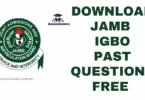Download JAMB Literature in English Past Questions Free 2024:- Literature in English can be a challenging subject for many JAMB candidates. With its focus on literary analysis, comprehension, and the deep understanding of novels, plays, and poetry, the subject requires more than just reading through your textbooks—it requires targeted practice. One of the best ways to prepare is by solving past JAMB Literature in English questions. This guide will show you how to download JAMB Literature past questions for free, why they’re crucial for your preparation, and how to use them to increase your chances of acing the 2024 exam.
Download JAMB Literature in English Past Questions Free 2024
Here are 20 sample multiple-choice (OBJ) JAMB Literature in English past questions for practice:
1. In a play, the character who opposes the protagonist is called:
A) Foil
B) Antagonist
C) Protagonist
D) Hero
2. The main theme in Shakespeare’s play Macbeth is:
A) Jealousy and vengeance
B) Ambition and power
C) Love and loyalty
D) Justice and revenge
3. Which of the following is a characteristic of a tragic hero?
A) Excessive pride leading to their downfall
B) An unending happiness
C) A focus on wealth
D) A lack of emotional depth
4. Who is the author of Things Fall Apart?
A) Ngũgĩ wa Thiong’o
B) Wole Soyinka
C) Chinua Achebe
D) Amos Tutuola
5. In literature, the term “allegory” refers to:
A) A story that uses metaphors to convey a moral lesson
B) A long poem that tells a story
C) A speech made by a character
D) The main problem faced by the protagonist
6. In The Catcher in the Rye, the main character, Holden Caulfield, symbolizes:
A) The innocence of childhood
B) The struggles of adulthood
C) The loss of innocence
D) The pursuit of knowledge
7. Which of the following best defines “irony” in literature?
A) A situation where the outcome is opposite to what was expected
B) The use of descriptive language to appeal to the senses
C) The repetition of words or phrases for emphasis
D) The introduction of humor into a serious situation
8. The theme of Animal Farm by George Orwell primarily explores:
A) The consequences of war
B) The dangers of power and corruption
C) The role of leadership in a community
D) The effects of capitalism on society
9. In Romeo and Juliet, the conflict between the Montagues and Capulets is an example of:
A) Internal conflict
B) Man vs. man conflict
C) Man vs. society conflict
D) Man vs. nature conflict
10. Which of the following is an example of a literary device?
A) Plot
B) Conflict
C) Foreshadowing
D) Setting
11. The protagonist of Pride and Prejudice is:
A) Lady Catherine de Bourgh
B) Elizabeth Bennet
C) Jane Bennet
D) Mr. Darcy
12. What is the setting of Wuthering Heights by Emily Brontë?
A) London
B) Wuthering Heights and Thrushcross Grange in Yorkshire
C) New York City
D) The moors of Scotland
13. In poetry, the term “metaphor” refers to:
A) An exaggeration for effect
B) The repetition of consonant sounds
C) A comparison between two unlike things without using “like” or “as”
D) A pattern of stressed and unstressed syllables
14. Which of the following is an example of a Shakespearean tragedy?
A) The Tempest
B) A Midsummer Night’s Dream
C) Julius Caesar
D) Much Ado About Nothing
15. The central conflict in Heart of Darkness by Joseph Conrad revolves around:
A) The exploitation of African resources
B) The impact of European colonialism on Africa
C) The moral dilemmas of the protagonist
D) The pursuit of wealth through trade
16. In the novel Frankenstein by Mary Shelley, the monster symbolizes:
A) The consequence of unchecked ambition
B) The triumph of good over evil
C) The strength of human will
D) The quest for knowledge
17. In the poem “The Road Not Taken” by Robert Frost, the central idea is:
A) The journey through life and the importance of choices
B) The importance of always taking the well-traveled path
C) The inevitability of regret
D) The simplicity of nature
18. Which of the following is a characteristic of modernist literature?
A) A focus on traditional forms and structures
B) The use of symbolism, fragmented narratives, and a focus on individual consciousness
C) The exploration of religious themes
D) The use of humor and satire
19. In a literary work, “point of view” refers to:
A) The time period in which the story takes place
B) The narrator’s position relative to the story
C) The conflict that drives the plot
D) The setting where the story unfolds
20. The use of an object, character, or event to represent a larger idea or theme in literature is known as:
A) Allegory
B) Symbolism
C) Hyperbole
D) Allusion
Why Past Questions Are a Game-Changer for Literature in English
JAMB Literature in English tests your understanding of a wide range of texts, so using past questions effectively can make a huge difference. Here’s why:
- Familiarize Yourself with Exam Patterns
Literature in English isn’t just about knowing the texts; it’s about understanding how to interpret questions based on those texts. JAMB questions typically focus on themes, character analysis, and the author’s intent. By practicing with past questions, you’ll quickly recognize the most commonly tested areas and how questions are typically framed, helping you feel prepared and confident on exam day. - Understand the Types of Questions
The more you practice, the better you’ll understand the different types of questions that often appear: character analysis, plot development, themes, and literary devices like symbolism and imagery. Past questions provide the opportunity to tackle these areas under real exam conditions. - Improve Time Management
In a timed exam, it’s easy to get bogged down in lengthy analysis. Past questions help you practice how to quickly extract the right information from texts and respond to questions in a clear, concise manner—critical for success in the real exam.
Where to Find Free JAMB Literature in English Past Questions
To get started with past questions, make sure you’re getting them from reliable sources. Here are the best places to download them for free:
- JAMB Official Website
The official JAMB website should be your first stop. They provide free, authentic past questions that are updated and relevant to the current syllabus. - Pass.ng
Pass.ng is a well-known platform offering past JAMB questions for free, including for Literature in English. It also provides detailed explanations for each answer, helping you understand the reasoning behind your responses. - Examplaza.ng
Examplaza is another great resource for downloading past JAMB Literature questions. They regularly update their database, so you’re getting the most relevant content for the 2024 exam. - EkoBrain
EkoBrain is a trusted platform that provides downloadable past questions for a variety of subjects, including Literature in English. It’s user-friendly and constantly updated, ensuring you have access to the latest materials.
How to Download JAMB Literature in English Past Questions for Free
Here’s a step-by-step guide to downloading past questions:
- Go to a Trusted Site
Head to reliable platforms like Pass.ng, Examplaza.ng, or EkoBrain. - Select the Year and Subject
Choose the year (2024) and the subject (Literature in English) from the options available. - Click the Download Link
Once you’ve selected the correct year and subject, click the download button. You might need to enter your email address to receive the download link. - Save the Files
After the questions are downloaded, save them to your device. Organize them by year or by topic for easy access when studying. - Start Practicing
Now, it’s time to start practicing! Treat each past question as if you’re sitting for the real exam—don’t rush, and take time to think through your answers.
How to Use JAMB Past Questions Effectively
Downloading past questions is just the start. Here’s how to use them to prepare efficiently:
- Simulate Real Exam Conditions
Time yourself while solving past questions. JAMB gives you a limited time for each section, so practicing under those same constraints will help you develop your time management skills and ensure you’re ready for the real exam pressure. - Focus on Key Literary Elements
Literature in English frequently tests your knowledge of key literary elements such as themes, character development, and literary devices. After solving past questions, pay close attention to questions that focus on these areas, as they are often recurring themes in the exam. - Understand the Texts Thoroughly
Literature in English is based on the texts you’re required to study. When practicing with past questions, make sure you understand the text inside out—this means knowing the plot, characters, themes, and how different literary devices are used throughout the work. - Analyze Your Mistakes
Whenever you get an answer wrong, take time to understand why. JAMB Literature questions often require critical thinking, so revisiting the text and figuring out what you missed is a key learning step. - Use Marked Past Questions
After practicing with past questions, go over the explanations, especially the ones you got wrong. This helps reinforce your understanding of the material and ensures you’re learning from your mistakes.
Additional Tips to Succeed in JAMB Literature in English
If you’re serious about getting an outstanding score, here are a few extra strategies:
- Master the Core Themes and Characters
JAMB Literature often tests your understanding of key characters, their development, and the themes in the prescribed texts. Pay attention to recurring themes such as love, betrayal, revenge, and social justice. Also, focus on the main characters and their motivations. - Practice Literary Devices
JAMB loves to test your understanding of literary devices like metaphor, simile, symbolism, imagery, irony, and personification. Be sure you know how these devices are used in the texts you’ve studied. - Review Past Novels, Plays, and Poems
JAMB Literature includes a mix of novels, plays, and poetry. Make sure you are well-versed in all prescribed works for your year. Read summaries, analyses, and critical reviews to reinforce your understanding of each text. - Stay Updated on Current Literature
Though the primary focus is on your prescribed texts, sometimes JAMB includes questions that reflect current trends in literature or ask you to apply knowledge to real-world contexts. Keeping up with literary news could be a helpful edge. - Use Study Guides and Notes
Consider using study guides or notes from reputable sources like Olabode’s Literature in English or Past Questions Companions to guide your studies. These resources help clarify difficult concepts and provide more focused practice.
Maximizing Your Free JAMB Past Questions Download
Once you’ve downloaded your free past questions, here are some ways to make sure you’re getting the most out of them:
- Mix Free Resources with Paid Ones
While free past questions are a great starting point, consider investing in paid study guides or study apps that provide detailed explanations, analysis, and additional practice. - Track Your Progress
Use tools like Google Sheets or Trello to track your progress. You can list the number of past questions you’ve solved and track which topics you’ve covered and which need more attention. - Use Literature Apps
Download apps like JAMB Exam Prep to practice Literature in English questions on the go. These apps often allow you to simulate the exam environment, track your performance, and even generate random practice sets.
Conclusion
JAMB Literature in English past questions are one of the most valuable tools you can use to prepare for the 2024 exam. By downloading them for free and practicing effectively, you’ll improve your understanding of key themes, characters, and literary devices, while also boosting your exam-taking speed and confidence. The more you practice, the better your chances of excelling. Stay focused, use your mistakes as stepping stones, and keep practicing—success in JAMB Literature is within your reach. Best of luck!
Recommended Post
- Download JAMB Chemistry Past Questions Free 2024
- Download JAMB Physics Past Questions Free 2024
- Download JAMB Biology Past Questions Free 2024
- Download JAMB Yoruba Past Questions Free 2024
- Download JAMB Mathematic Past Questions Free 2024
- Download JAMB English Past Questions Free 2024
- Download JAMB Further Maths Past Questions Free 2024
- Download JAMB Government Past Questions Free 2024
- Download JAMB Economics Past Questions Free 2024
- Download JAMB Lit. In English Past Questions Free 2024
- Download JAMB Music Past Questions Free 2024
- How Much Is EKSU Acceptance Fee for 2025/2026 ?






